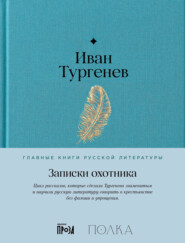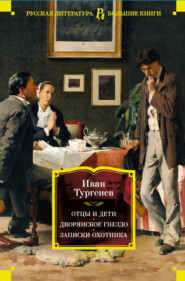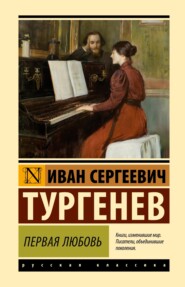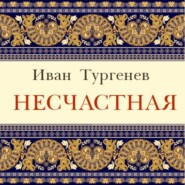По всем вопросам обращайтесь на: info@litportal.ru
(©) 2003-2024.
✖
Fathers and Sons
Настройки чтения
Размер шрифта
Высота строк
Поля
Paul Petrovitch stared. He had not quite expected this. For his part, Arkady reddened with pleasure.
"Allow me," interposed Nikolai Petrovitch. "You say that you deny everything – rather, that you would consign everything to destruction. But also you ought to construct."
"That is not our business," said Bazarov. "First must the site be cleared."
"Yes; for the present condition of the people demands it," affirmed Arkady. "And that demand we are bound to fulfil, seeing that no one has the right merely to devote himself to the satisfaction of his own personal egotism."
With this last Bazarov did not seem altogether pleased, since the phrase smacked too much of philosophy – rather, of "Romanticism," as Bazarov termed that science; but he did not trouble to confute his pupil.
"No, no!" Paul Petrovitch exclaimed with sudden heat. "I cannot believe that gentlemen of your type possess sufficient knowledge of the people to be rightful representatives of its demands and aspirations. For the Russian people is not what you think it to be. It holds traditions sacred, and is patriarchal, and cannot live without faith."
"I will not dispute that," observed Bazarov. "Nay, I will even agree that you are right."
"And, granting that I am right – "
"You have proved nothing."
"Yes, proved nothing," echoed Arkady with the assurance of a chess-player who, having foreseen a dangerous move on the part of his opponent, awaits the attack with expert composure.
"But how have I proved nothing?" muttered Paul Petrovitch, rather taken aback. "Do you mean to say that you are opposed to, not in favour of, the people?"
"Good gracious! Do not the common folk believe, when it thunders, that the Prophet Elijah is going up to Heaven in his chariot? You and I do not agree with that? The point is that the people is Russian, and that I am the same."
"Not after what you have just said! Henceforth must I decline to recognise you as any countryman of mine."
With a sort of indolent hauteur Bazarov replied:
"With his own hand did my grandfather guide the plough. Ask, therefore, of your favourite peasant which of us two – you or myself – he rates most truly as his countryman. Why, you do not know even how to speak to him!"
"And you, while speaking to him, despise him."
"Should he merit contempt, yes. Reprobate, therefore, my views as much as you like, but who told you that they have come to me fortuitously rather than been derived from the very national spirit of which you are so ardent an upholder?"
"Phaugh! We need you Nihilists, do we not?"
"Not ours is it to decide the need or otherwise, seeing that even a man like yourself considers that he has a use."
"Gentlemen, gentlemen!" interposed Nikolai Petrovitch as he rose to his feet. "I beg of you to indulge in no personalities!"
Paul Petrovitch smiled. Then, laying his hand upon his brother's shoulder, he forced him to resume his seat.
"Do not be alarmed," he said. "That very sense of dignity at which this gentleman pokes such bitter fun will keep me from forgetting myself."
And he turned to Bazarov again.
"Do you suppose your doctrine to be a new one?" he continued. "If so, you are wasting your time. More than once has the Materialism which you preach been mooted; and each time it has been proved bankrupt."
"Another foreign term!" muttered Bazarov. He was now beginning to lose his temper, and his face had turned a dull, copperish tint. "In the first place, we Nihilists preach nothing at all. For to preach is not our custom."
"What, then, is your custom?"
"To proclaim facts such as that our civil servants accept bribes, that we lack highways, commerce, and a single upright judge, and that – "
"Of course, of course! In other words, you and yours are to act as our 'censors' (I believe that to be the correct term?). Well, I agree with many of your censures, but – "
"Other tenets which we hold are that to chatter, and to do nothing but chatter, concerning our differences is not worth the trouble, seeing that it is a pursuit which merely leads to pettiness and doctrinairism; that beyond question are our so-called leaders and censors not worth their salt, seeing that they engage in sheer futilities, and waste their breath on discussions on art and still life and Parliamentarism and legal points and the devil only knows what, when all the time it is the bread of subsistence alone that matters, and we are being stifled with gross superstition, and all our commercial enterprises are failing for want of honest directors, and the freedom of which the Government is for ever prating is destined never to become a reality, for the reason that, so long as the Russian peasant is allowed to go and drink himself to death in a dram-shop, he is ready to submit to any sort of despoilment."
"You have decided, then, you feel conscious, that your true métier is to apply yourselves seriously to nothing?"
"Even so," came the sullen reply, for Bazarov had suddenly become vexed with himself for having exposed his mind with such completeness to this barin.
"You have decided merely to deny everything?"
"We have decided merely to deny everything."
"And that you call Nihilism?"
"That we call Nihilism." In Bazarov's repetition of Paul Petrovitch's words there echoed, this time, a note of pride.
Paul Petrovitch knit his brows.
"So, so!" he said in a voice that was curiously calm. "Nihilism is designed to combat our every ill, and you alone are to act as our saviours and our heroes! Well, well! But in what consider you yourselves and your censorious friends to excel the rest of us? For you chatter as much as does every one else."
"No, no!" muttered Bazarov. "At least we are not guilty of that, however we may err in other ways."
"You do things, then? At all events, you are preparing to do things?"
Bazarov did not reply, although, in his excitement, Paul Petrovitch had started up and then quickly recovered his self-command.
"H'm!" continued Paul Petrovitch. "With you to act is to demolish. But how is such demolition to benefit when you do not even know its purpose?"
"We demolish because we are a force," interposed Arkady.
Paul Petrovitch stared – then smiled.
"And a force need render account to no one," added Arkady with a self-conscious straightening of his form.
"Fool!" gasped Paul Petrovitch. Evidently he could contain himself no longer. "Have you ever considered what you are maintaining with your miserable creed? Even an angel would lose patience! 'A force,' forsooth! You might as well say that the wild Kalmuck, or the barbaric Mongol, represents a force. What boots such a force? Civilisation and its fruits are what we value. And do not tell me that those fruits are to be overlooked, seeing that even the meanest barbouilleur,[13 - Scribbler.] the meanest piano-player who ever earned five kopecks a night, is of more use to society than you. For men of that kind at least stand for culture rather than for some rude, Mongolian propelling-power. Yes, you may look upon yourselves as 'the coming race,' yet you are fit but to sit in a Kalmuck shanty. 'A force,' forsooth! Good and 'forceful' sirs, I beg to tell you that you number but four men and a boy, whereas those others number millions, and are folk of the kind who will not permit such as you to trample upon their sacred beliefs, but will first trample upon your worthy selves."
"Let them trample upon us," retorted Bazarov. "We are more in number than you think."
"What? You really believe that you will succeed in inoculating the nation as a whole?"
"From a little candle," replied Bazarov, "there arose, as you know, the conflagration of Moscow."[14 - In 1812.]
"A pride almost Satanic in its nature, and then banter! And thus you would seek to attract our youth, thus you would attempt to win the inexperienced hearts of our boys! For sitting beside you is one of those very boys, and he is absolutely worshipping you!" (Upon this Arkady knit his brows, and averted his head a little.) "Yes, the canker has spread far already. For instance, they tell me that in Rome our artists decline to enter the Vatican, and look upon Raphael as next-door to a fool, just because he is an 'authority'! Yet those very artists are themselves so barren and impotent that their fancy cannot rise above 'Girls at Fountains,' and so forth, villainously executed! And such artists you account fine fellows, I presume?"
"Like those artists," said Bazarov, "I consider Raphael to be worth not a copper groat. And as for the artists themselves, I appraise them at about a similar sum."
"Allow me," interposed Nikolai Petrovitch. "You say that you deny everything – rather, that you would consign everything to destruction. But also you ought to construct."
"That is not our business," said Bazarov. "First must the site be cleared."
"Yes; for the present condition of the people demands it," affirmed Arkady. "And that demand we are bound to fulfil, seeing that no one has the right merely to devote himself to the satisfaction of his own personal egotism."
With this last Bazarov did not seem altogether pleased, since the phrase smacked too much of philosophy – rather, of "Romanticism," as Bazarov termed that science; but he did not trouble to confute his pupil.
"No, no!" Paul Petrovitch exclaimed with sudden heat. "I cannot believe that gentlemen of your type possess sufficient knowledge of the people to be rightful representatives of its demands and aspirations. For the Russian people is not what you think it to be. It holds traditions sacred, and is patriarchal, and cannot live without faith."
"I will not dispute that," observed Bazarov. "Nay, I will even agree that you are right."
"And, granting that I am right – "
"You have proved nothing."
"Yes, proved nothing," echoed Arkady with the assurance of a chess-player who, having foreseen a dangerous move on the part of his opponent, awaits the attack with expert composure.
"But how have I proved nothing?" muttered Paul Petrovitch, rather taken aback. "Do you mean to say that you are opposed to, not in favour of, the people?"
"Good gracious! Do not the common folk believe, when it thunders, that the Prophet Elijah is going up to Heaven in his chariot? You and I do not agree with that? The point is that the people is Russian, and that I am the same."
"Not after what you have just said! Henceforth must I decline to recognise you as any countryman of mine."
With a sort of indolent hauteur Bazarov replied:
"With his own hand did my grandfather guide the plough. Ask, therefore, of your favourite peasant which of us two – you or myself – he rates most truly as his countryman. Why, you do not know even how to speak to him!"
"And you, while speaking to him, despise him."
"Should he merit contempt, yes. Reprobate, therefore, my views as much as you like, but who told you that they have come to me fortuitously rather than been derived from the very national spirit of which you are so ardent an upholder?"
"Phaugh! We need you Nihilists, do we not?"
"Not ours is it to decide the need or otherwise, seeing that even a man like yourself considers that he has a use."
"Gentlemen, gentlemen!" interposed Nikolai Petrovitch as he rose to his feet. "I beg of you to indulge in no personalities!"
Paul Petrovitch smiled. Then, laying his hand upon his brother's shoulder, he forced him to resume his seat.
"Do not be alarmed," he said. "That very sense of dignity at which this gentleman pokes such bitter fun will keep me from forgetting myself."
And he turned to Bazarov again.
"Do you suppose your doctrine to be a new one?" he continued. "If so, you are wasting your time. More than once has the Materialism which you preach been mooted; and each time it has been proved bankrupt."
"Another foreign term!" muttered Bazarov. He was now beginning to lose his temper, and his face had turned a dull, copperish tint. "In the first place, we Nihilists preach nothing at all. For to preach is not our custom."
"What, then, is your custom?"
"To proclaim facts such as that our civil servants accept bribes, that we lack highways, commerce, and a single upright judge, and that – "
"Of course, of course! In other words, you and yours are to act as our 'censors' (I believe that to be the correct term?). Well, I agree with many of your censures, but – "
"Other tenets which we hold are that to chatter, and to do nothing but chatter, concerning our differences is not worth the trouble, seeing that it is a pursuit which merely leads to pettiness and doctrinairism; that beyond question are our so-called leaders and censors not worth their salt, seeing that they engage in sheer futilities, and waste their breath on discussions on art and still life and Parliamentarism and legal points and the devil only knows what, when all the time it is the bread of subsistence alone that matters, and we are being stifled with gross superstition, and all our commercial enterprises are failing for want of honest directors, and the freedom of which the Government is for ever prating is destined never to become a reality, for the reason that, so long as the Russian peasant is allowed to go and drink himself to death in a dram-shop, he is ready to submit to any sort of despoilment."
"You have decided, then, you feel conscious, that your true métier is to apply yourselves seriously to nothing?"
"Even so," came the sullen reply, for Bazarov had suddenly become vexed with himself for having exposed his mind with such completeness to this barin.
"You have decided merely to deny everything?"
"We have decided merely to deny everything."
"And that you call Nihilism?"
"That we call Nihilism." In Bazarov's repetition of Paul Petrovitch's words there echoed, this time, a note of pride.
Paul Petrovitch knit his brows.
"So, so!" he said in a voice that was curiously calm. "Nihilism is designed to combat our every ill, and you alone are to act as our saviours and our heroes! Well, well! But in what consider you yourselves and your censorious friends to excel the rest of us? For you chatter as much as does every one else."
"No, no!" muttered Bazarov. "At least we are not guilty of that, however we may err in other ways."
"You do things, then? At all events, you are preparing to do things?"
Bazarov did not reply, although, in his excitement, Paul Petrovitch had started up and then quickly recovered his self-command.
"H'm!" continued Paul Petrovitch. "With you to act is to demolish. But how is such demolition to benefit when you do not even know its purpose?"
"We demolish because we are a force," interposed Arkady.
Paul Petrovitch stared – then smiled.
"And a force need render account to no one," added Arkady with a self-conscious straightening of his form.
"Fool!" gasped Paul Petrovitch. Evidently he could contain himself no longer. "Have you ever considered what you are maintaining with your miserable creed? Even an angel would lose patience! 'A force,' forsooth! You might as well say that the wild Kalmuck, or the barbaric Mongol, represents a force. What boots such a force? Civilisation and its fruits are what we value. And do not tell me that those fruits are to be overlooked, seeing that even the meanest barbouilleur,[13 - Scribbler.] the meanest piano-player who ever earned five kopecks a night, is of more use to society than you. For men of that kind at least stand for culture rather than for some rude, Mongolian propelling-power. Yes, you may look upon yourselves as 'the coming race,' yet you are fit but to sit in a Kalmuck shanty. 'A force,' forsooth! Good and 'forceful' sirs, I beg to tell you that you number but four men and a boy, whereas those others number millions, and are folk of the kind who will not permit such as you to trample upon their sacred beliefs, but will first trample upon your worthy selves."
"Let them trample upon us," retorted Bazarov. "We are more in number than you think."
"What? You really believe that you will succeed in inoculating the nation as a whole?"
"From a little candle," replied Bazarov, "there arose, as you know, the conflagration of Moscow."[14 - In 1812.]
"A pride almost Satanic in its nature, and then banter! And thus you would seek to attract our youth, thus you would attempt to win the inexperienced hearts of our boys! For sitting beside you is one of those very boys, and he is absolutely worshipping you!" (Upon this Arkady knit his brows, and averted his head a little.) "Yes, the canker has spread far already. For instance, they tell me that in Rome our artists decline to enter the Vatican, and look upon Raphael as next-door to a fool, just because he is an 'authority'! Yet those very artists are themselves so barren and impotent that their fancy cannot rise above 'Girls at Fountains,' and so forth, villainously executed! And such artists you account fine fellows, I presume?"
"Like those artists," said Bazarov, "I consider Raphael to be worth not a copper groat. And as for the artists themselves, I appraise them at about a similar sum."

















